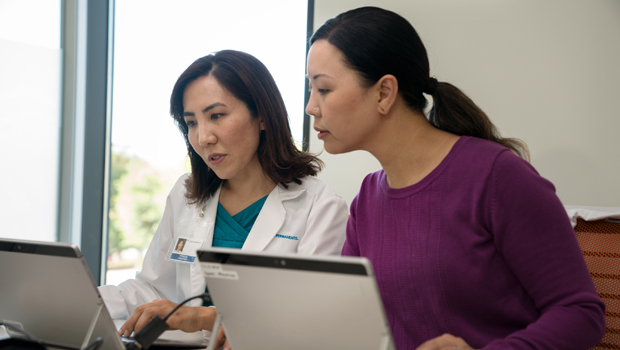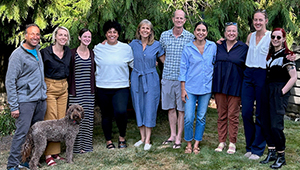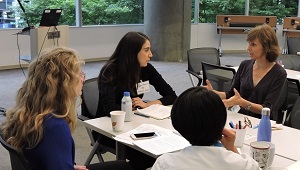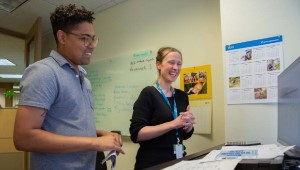Training scientists as partners in transforming primary care

Newly funded center will elevate equity and community in learning health system research
How can researchers help integrated health systems and community health centers meet the challenges of providing equitable, high-quality primary care? One promising strategy is to expand opportunities for learning health system (LHS) research — where scientists design and conduct research projects in partnership with real-world care organizations to continually improve care and health across diverse populations. A newly funded project is taking LHS research to the next level by putting sustainable and long-term primary care partnerships front and center and prioritizing health care systems that serve diverse populations often not reached by these types of programs.
With a 5-year, $5 million grant from the Agency for Healthcare Research and Quality (AHRQ) and the Patient-Centered Outcomes Research Institute (PCORI), a team led by researchers at Kaiser Permanente Washington Health Research Institute (KPWHRI) will help develop the next generation of LHS scientists with expertise in transforming primary care to effectively meet growing care needs.
Led by KPWHRI’s Center for Accelerating Care Transformation (ACT Center) and the University of Washington, the Washington Learning Health System Embedded Scientist Training and Research Center (WA LHS E-STAR Center) will train emerging LHS scientists in partnership with 6 primary care organizations: Kaiser Permanente Washington, the Department of Veterans Affairs (VA) Puget Sound, and 4 Federally Qualified Health Centers (FQHCs) located across rural and urban areas of Washington state. The research model will include a stakeholder steering committee made up of health system patients and leaders who will bring their experience and insight to decisions about the research direction and program design.
"Primary care is an essential setting for improving population health outcomes and reducing health disparities, and FQHCs are the first line of care for millions of people who experience financial and social barriers to care,” said Paula Lozano, MD, MPH, KPWHRI senior investigator and E-STAR co-director. “By training scientists to conduct research that serves the priorities of our diverse partner health care organizations and their patients, the E-STAR Center will pave the way for LHS research that improves care in practical, patient-centered, and sustainable ways — while also moving the needle on health equity.”
Building on previous success
Learning health systems have a culture of continuous improvement, where internal data and external evidence are used to improve care on an ongoing basis. Through the ACT Center, Lozano oversees Kaiser Permanente Washington’s learning health system program. This new grant builds on both the ACT Center’s expertise in LHS research and KPWHRI's previous experience training early-career scientists in research techniques to improve experiences and outcomes for patients and health care providers.
Past and ongoing LHS projects at the ACT Center include using advanced statistical methods to guide critical decision-making during the COVID-19 pandemic and designing a new approach to addressing teen mental health in primary care. The E-STAR Center will build new infrastructure for partnerships between researchers and health care organizations, train 7 early-career researchers in LHS research, and lead embedded LHS research at the 6 participating primary care organizations.
"By expanding on the success we've had training researchers in a learning health systems approach, we can develop and mentor scientists who are able to change the paradigm of primary care," Lozano said.
With advancing health equity as a key objective, the E-STAR Center will focus on community-based participatory research principles. This approach emphasizes an equitable structure to research projects that fully involves community members and care providers, making space for shared leadership and influence.
"Equitable partnerships are crucial for designing research projects that meet the needs of the community and build trust," Lozano said. "We're aiming for authentic collaboration at every stage, from the beginning of a project to the end."
James Ralston, MD, MPH, a senior investigator at KPWHRI, will co-lead the E-STAR Center, working with other scientists from KPWHRI, the University of Washington School of Public Health and School of Medicine, and VA Puget Sound.
“We’re grateful for the opportunity to build this center in partnership with primary care leaders, patients, and researchers,” Lozano said. “With the E-STAR Center, we’re moving from opportunistic research collaborations to formal, sustainable partnerships between researchers and care organizations. By prioritizing participatory research and health equity, we hope to create meaningful improvements in care that benefit populations who are most in need. We’re very excited about the work ahead.”
By Amelia Apfel
News

Training scientists to transform health care
Five years and 8 scholars later, KPWHRI celebrates the impact of the CATALyST training program on early-career scientists.
Learning health systems

Scholars and mentors strengthen bridge between research and care delivery
New paper shows mentorship boosts evidence-based, patient-centered care.
Healthy findings blog

A practical roadmap to guide learning health systems
Claire Allen shares how a new paper from our LHS Program can help learning health systems move from concept to reality.


